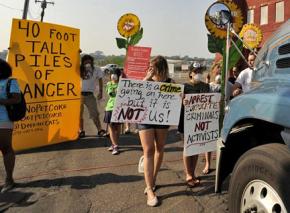The dirtiest of dirty fuels
Petroleum coke is yet another way that oil from Canada's tar sands is contributing to the poisoning of Detroit in particular and the earth in general, explains .
IF YOU visited the Detroit riverfront just east of the Ambassador Bridge before, you wouldn't see much more than Windsor, Ontario, and a handful of people killing time with some beers and a fishing rod. Since last March, however, something has suddenly interrupted the relatively serene atmosphere: three-story-tall mountains of toxic black dust.
Petroleum coke (or petcoke)--sometimes called "the dirtiest of dirty fuels"--is a waste byproduct of tar-sands oil often used as an inexpensive substitute for coal. It is being stored by the tons on the Detroit riverfront. Left uncovered, virtually any wind stronger than a breeze can carry the fine powder into the homes of nearby residents.
"The dust was getting everywhere--on the floors, the windowsills, everywhere," recalled one local resident to reporters in June. The dust had grown so thick in the parking garage of a nearby apartment building that people left behind footprints as they walked through it.
Storage companies have assured affected communities that all the necessary safety precautions have been taken, despite the fact that they haven't obtained the proper permits. A photo released in May, however, revealed an open storm drain that could have been carrying contaminated runoff into the river for months before it was discovered.

The Michigan Department of Environmental Quality (MDEQ) has announced that petroleum coke poses no "significant" health risk while inert, but this has done little to temper the concerns of local residents and activists. A coalition, including the Detroit Coalition Against Tar Sands (D-CATS), organized a march and sit-in in late June that successfully turned away several trucks en route to the storage terminal.
"I have children," one local resident participating in the march told reporters. "We like to swim, we like to fish and enjoy clean water. I'm here to take a stand for that."
Pressure from local activists has already won some important victories. In mid-June, the Nicholson Terminal & Dock Co. announced that they "re-evaluated the situation" and decided to discontinue storage of petroleum coke--eliminating the smaller of the two separate storage sites. And in late June, Detroit Bulk Storage announced that it would reduce the size of its petcoke piles from 40 to 20 feet high.
Legislation has already been introduced that would force companies to store petroleum coke in enclosed containers. This would address the immediate concerns regarding air and water contamination, but as one reporter with the local alternative weekly Metro Times has noted:
There is controversy surrounding every step of the process: From the massive environmental damage under way in Alberta, to the piping of the tar-like bitumen...to the refining of what critics call the world's "dirtiest" fuel, and finally, to the storage and burning of petcoke itself.
PETROLEUM COKE is often sold as a cheap fossil fuel and used as a substitute for coal. When burned, it can emit between 30 and 80 percent more carbon dioxide than coal, according to a report by Oil Change International. In addition to higher carbon dioxide emissions, it also has a higher sulfur and metal content than coal, making it even more toxic.
Despite the risks associated with burning petcoke, plant operators have a major financial incentive to use it as a fuel. As a waste byproduct, it costs virtually nothing to produce. It is also difficult to store in large amounts, so producers have an incentive to move it fast by selling cheap. A typical coal plant, therefore, can save up to $120 million a year by burning a blend of petroleum coke and coal.
This incentive to sell combined with the influx of dirty tar-sands oil into the U.S. has led to a boom in petcoke production and exports. The U.S. exported a record 187 million barrels of petroleum coke in 2012, according to the U.S. Energy Information Administration. That outpaces the previous 2010 record by 20 million barrels.
The petcoke being stored on the Detroit River is produced by the downriver refinery owned by the Marathon Oil Corporation, which recently added a $2 billion expansion in order to take advantage of the oil boom coming from the Alberta Tar Sands. Once refined, it is sold to Koch Carbon, an energy company owned by the archconservative brothers Charles and David Koch.
The tar sands have been disastrous for Michigan and Detroit residents, despite being located more than 2,000 miles southeast from the Alberta Tar Sands. A pipeline transporting tar-sands oil burst and released more than a million gallons of crude into the Kalamazoo River in July 2010. It was the largest inland oil spill in American history to date. The Kalamazoo River continues to be dredged as part of the clean-up effort.
Furthermore, the Marathon Oil refinery is located in a neighborhood with the unfortunate distinction of also being the most heavily polluted zip code in Michigan. The refinement of tar-sands oil exposes local residents to more risk than the refinement of standard crude, as it releases more pollutants directly linked to asthma, emphysema and birth defects.
Possible air and water contamination on Detroit's riverfront by a toxic tar-sands byproduct is a stark reminder that no one is safe from the destructive reach of tar sands.


